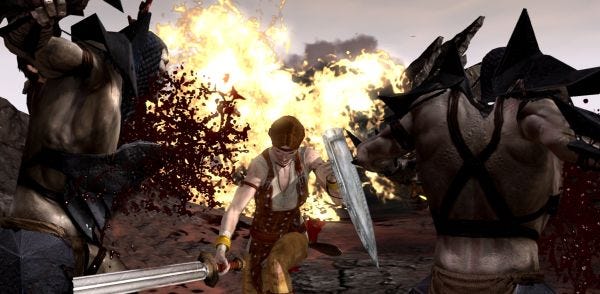Dragon Age III's Gaider On The Impracticality Of Sexism
Lots Of Reasons Why
All this talk of sexism isn't going away, nor should it. The gaming industry's sick, and the symptoms are plain as day. Mystifyingly often, however, the immediate reaction to even the faintest hint of that suggestion is "No, nuh-uh! You just want to censor expression! Give me one good reason we actually need to change."* Well, if you really want to move beyond "Because jeez, it's basic human decency to treat someone else the way you'd like to be treated," Dragon Age III lead writer David Gaider's got a laundry list of practical reasons for you. 14 years at one of the most influential studios out there, after all, will do that to you. Especially when it's one that's certainly not innocent of mistakes and missteps of its own. Prior to Gaider's GDC talk on the very same subject, I caught up with him to discuss why sexism (and any sort of "-ism," really) is bad for everyone: you, me, the industry, and of course, women or anyone else directly affected.
RPS: So what's the basic thesis of your GDC talk? I know you're discussing sex and sexism, but what conclusion are you ultimately trying to draw?
Gaider: Basically I’m saying that, from the perspective of a writer and a designer who’s had to deal with a lot of romance in games – romance and sex – which brings me directly into confrontation issues and sexism and sexuality… Until we had broached that topic, it was kind of a side issue. I guess back in the day, when we were first starting with it, it wasn’t something that the industry kept in mind at all. But the fact that we have charged directly into that field, that means… Sexism and sexuality issues are things that I end up having to deal with on a regular basis. I thought I could offer some feedback on that.
Essentially I guess the thrust of what I’m talking about is, the fact that we’ve had to confront these issues has made us better developers and has made our games more inclusive. That’s a good thing. In the talk I’m discussing why the industry doesn’t often treat that as more important, and maybe what we as an industry should be considering moving forward.
RPS: Did you see the recent thing about Remember Me, and the fact that the developer had to shop it around a bunch simply because their main character was female?
Gaider: Yeah, I find it interesting. I call it “accepted industry wisdom.” The thing about accepted industry wisdom is that you can’t question it. Everyone just agrees. It’s weird. The things that the industry decides are treated as incontrovertibly true until someone else comes along and proves them definitively wrong in a way that we cannot ignore. Then, of course, everyone jumps on it.
It’s like back when EverQuest was at its height. I think it had about 800,000 subscribers. At the time, accepted industry wisdom said, “Okay, some other MMOs have tried to come out and jump on EverQuest’s bandwagon and couldn’t do it. Obviously 800,000 subscribers is the MMO market. That’s capped out.” It was accepted. You couldn’t get more than that. Those were the only people who were interested in playing MMOs. Then World of Warcraft came out and it was a game-changer. Everyone said, “Oh, I guess we were wrong.”
To say that about female protagonists – that they just don’t sell [is myopic]. Over the last 10 years, how many titles have had female protagonists? And we’re supposed to accept, from those particular titles, that a) that constitutes a pattern, and b) the only reason those games were unsuccessful is because they had female protagonists? That is a real leap of logic. What it is, it’s just that accepted industry wisdom is often deciding that the reasons these things happen are because we’ve already come to an assumption and we’re trying to justify that assumption. So yes, there is lots of that in the industry.
RPS: You used the phrase "definitively wrong." Generally, in triple-A, the only way to make people feel that way is the bottom line. Money.
Gaider: Right. Ultimately that will always be the bottom line for the industry. Now, I think you would be wrong to characterize everyone in the industry as heartless and only driven by money. That’s not true. But ultimately the industry at large is only going to listen once money is involved. If you were to ask me, not that by any means I’m an authority on the subject… If you were to ask me what would make the industry change its mind about female protagonists, it would take some game coming out and being completely financially successful such that people in the industry couldn’t say, “Well, it was just because of this. Not because female protagonists are suddenly marketable.” It has to be something they couldn’t ignore. The only way the industry can’t ignore something is when money is involved.
RPS: The thing that throws me, though, is that it makes perfect monetary sense. It always has. Boring bald space commandos and city commandos and jungle commandos and shark commandos appeal to a pretty narrow group. Why do so many publishers refuse to see past them?
Gaider: They say this isn’t something guys want to do. It’s a strange bit of logic, to me anyway. It seems to say that maybe the people who are saying that, they wouldn’t like that idea, and they’re trying to justify it by projecting on that larger audience. I’m sure that if you talk to somebody who has experience in marketing, they would have lots of reasons or statistics to throw up as to why that would be the case. I’m not educated on it. This is coming from me with an outsider’s perspective. I just find some of the logic involved a little self-serving. It seems to justify what we want to do instead of looking at what it’s actually going to do.
RPS: But I would say you are in a position to really do something about it.
Gaider: Am I?
RPS: Well, you're helping guide a gigantic franchise on the creative side. That's a fair deal of power.
Gaider: I’m not in charge of anything. I’m a writer, which means that I have a lead designer, a project director, people higher up who provide me with parameters inside which I work. I can’t just say, “You know what? Dragon Age is going to have a female protagonist on the box.” That’s not my calling.
RPS: Nothing’s that easy, no. But you are in a place that affords you significant influence.
Gaider: I’m in a place to offer input, and I do that, yes. There are lots of people on the team and we’re all going to discuss it as a group. I think that the more discussion we have on issues like that, there will become a sense that [it's an issue]. I think what actually happens a lot in the industry is that some things are taken for granted. Nobody challenges them and talks about them. They’re just accepted as a given. The more discussion there is about those issues, the more we will stop accepting these little nuggets of accepted industry wisdom as beyond question.
RPS: For you personally, is that the next step: to discuss more and create awareness? I mean, clearly, that's what your doing here.
Gaider: That’s something that we’ve always done, at least on the BioWare side. I don’t know that it’s an agenda of mine, per se. I have an actual game to write. That’s not my first concern. But it is a concern. If we’re talking about how we need our big-budget games to sell to more people and have a larger audience, to say that that larger audience should only be 18-25 males exclusively… So, what, we’re all going to fight over the same demographic? There are actual reasons why having diversity in your games and being inclusive of a larger audience has sound financial backing. If you’re talking about that, maybe that’s the only way the industry is going to listen. It takes somebody to do it and do it well and prove that this is something that makes financial sense before the industry will accept that maybe it’s a thing.
RPS: You noted that it doesn't make sense to restrict audiences down to this tiny, largely young male demographic, and BioWare's trying to avoid that where its characters and themes are concerned. What about subject matter, though? Sci-fi and fantasy carry fairly narrow connotations - regardless of gender associations or whatever - and even subversions only get so much attention. How much will expanding game stories to more diverse audiences require moving outside that range of subject matter? How badly do you want to see games venture to new places?
Gaider: Don't get me wrong: I'm not suggesting the young male demographic is tiny. All I'm suggesting is that games shouldn't be limiting their audience right out of the gate. As you point out, things like choice of genre and mature content are already going to limit your audience to a degree... the answer isn't to only make family-rated games or to only make games of the most popular genres - though I'm sure that would work for some - but rather to keep our games accessible to as large an audience as we can. Let's experiment with difficult subjects and venture to new places, absolutely. Let's just take as many people with us to those new places as we can.
RPS: There’s also the other side of it, in that there’s a subset of people who are openly hostile toward the idea. This interview's going to get a string of incredibly negative comments. “Why would you talk about this? Why wouldn’t you talk about dragons and ages?”
Gaider: Well, it’s privilege, right? A lot of people treat that word with a very hostile attitude, because they feel like it’s an attack word. But it’s not. Privilege is just the assumption that something isn’t a problem because it’s not a problem for you personally. You’re in a group that’s normally being serviced, that’s part of the majority. You’re privileged because you’re accustomed to being in that group that gets all the content. You’re not necessarily interested in equality, because equality for you adds up to a lesser position – from your perspective – than you enjoyed before.
So yeah, there are definitely people who are going to be hostile to that idea. As nice as it is to be in the group that is being catered to exclusively, though… We’re talking about the industry at large needing to have broader appeal and a larger fanbase. Yeah, there are some people who don’t want that, because this is their playground. This is their treehouse, get out! But that’s where the industry is going.
RPS: Then there’s the other side of that particular coin. There was a thing on your Tumblr about it a while back, the stuff with the way that Isabela was dressed in Dragon Age II. There were a lot of people calling that out and saying, “Clearly, this is a very sexual depiction of a character.”
Gaider: Yeah. The thing I was discussing about that is, I understand why they would address it, because you have to look at Isabela in the context of the game she’s in. I think there was balance in her depiction versus the depiction of other female characters. There was a reason why she was sexualized. And she was sexualized – it was on purpose. The thing that would bother me more is having a character who was sexualized who has no reason to be sexualized. If Aveline had had her armor cut to show her cleavage and stuff, how bizarre would that be?
But they’re justified in challenging Isabela’s depiction. Aside from the context of Isabela in her game, there is Isabela in the industry at large, and because this sexualization of female characters is so pervasive in the industry, to expect that anybody could at a glance look at Isabela and know that she's different is quite a leap. I mean, it’s arguable. I’m not gonna say she’s above reproach. In that context, maybe she’s okay. But that’s a big thing to expect. Of course there’s a lot of people who are up in arms. Why wouldn’t you be, because it seems like this is everywhere? At a glance, yes, you can look at Isabela and say, “Yes, that’s a great example of what I’m talking about.”
RPS: Do you think that’s an example of why, especially now, quality writing is becoming more important for games? In that context, Isabela could have been a very offensive character, had she not been an actual character, essentially.
Gaider: It’s a funny line to walk. When someone starts arguing about something like sexualization of female characters, the automatic argument that some people go to is that they think you’re arguing the exact opposite, that the only answer to having sexualized characters is to have every character be non-sexual completely. I don’t think that’s what anyone’s suggesting. That’s an extreme reaction to the problem, so I can see why some people might go that way – the answer is to cover everybody up with burqas or whatever.
The difference between sexy and sexualized… Sexy is good, but I think that a lot of people, they have a sexualized character and they think, “That’s sexy. Everyone should think that’s sexy and think that’s a good thing to look at.” It becomes this pattern across the industry. That’s when it becomes an issue. So yeah, these things do have to be individually challenged. They do have to be supported by the writing. I don’t necessarily think it’s a reason why writing is more important. I just think that it’s a process you can’t just cut out. The idea that, “Okay, we’re going to have a female character. Let’s create her as a sexualized character without even considering her place in the game or the variety of depictions of female characters.”
Or people of color in games. Those are things you should at some point stop and think about. If we happen to make a game that has a lot of female characters and every single one of them is sexualized… Even then, let’s say the writing actually supported that and every one of those characters had a very valid reason to be sexualized. Well, maybe, at that point, you need to step back and say, “Why did we create a whole bunch of justifiably sexualized characters? What are we saying about those characters and about women that might end up being hostile to a female audience?”
It’s not that you have to make a game that says, “Hey, female audience! We’re here just for you!” No. It’s about making a game that isn’t telling the female audience, “You’re not who we want to play this game.” Just disinviting them. That’s something that the industry needs to get to. Not figuring out whether they should have pink boxes and unicorns because they think that would appeal to women. That’s not what anybody is talking about, at least that I’ve ever seen.
Check back tomorrow for part two, in which we discuss fan reaction to Dragon Age 2, why it maybe got a bit more appreciation than it got, themes Dragon Age 3 will explore, and fantasy's ability to be more than simple wish fulfillment.
*This can also be translated as "I'm a blathering numbskull. Gobble gobble gobble ptttthrtppt" I'm sorry. I tried to be mature. Instead I just made you read more of the article.














